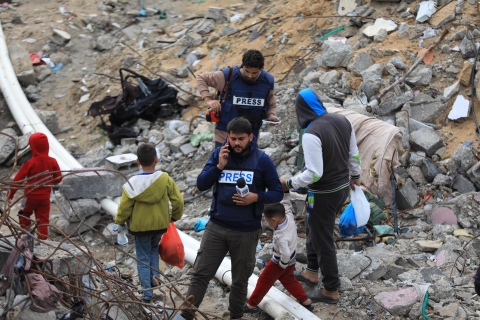
Journalists in the ICFJ network are among the many courageous local reporters on the ground in Gaza who are working to document the death and destruction they are experiencing firsthand, in a war that has led to the deadliest period for journalists since the Committee to Protect Journalists (CPJ) began gathering data in 1992.
Preliminary CPJ investigations have found at least 85 journalists and media workers in the region have been killed since Oct. 7, when Hamas militants brutally attacked Israelis and foreigners, killed around 1,200 people and seized more than 240 hostages. In the four months since, Israel responded with one of the most intense bombardments in the history of modern warfare, killing more than 27,800 Palestinians and displacing an estimated 1.9 million people.
"I work without any protection,” said Mohammed Fayez Abo Oun, a member of the Arabic-language ICFJ Crisis Reporting Forum, who abandoned his filmmaking equipment in his house in Gaza City, which was destroyed. “No armor. No helmet. No camera, and currently I report via my mobile phone.”
“There are many untold stories such as the residential buildings which were destroyed in northern Gaza and the mass graves there,” he said.
ICFJ has spoken with several members of our network in Gaza, who have described severe challenges, including the killing of colleagues and family members, displacement, destroyed equipment and the threat of attacks. According to CPJ, 78 of the 85 journalists killed in the conflict so far were Palestinians.
“Many Gazan journalists have been uprooted from their homes, lost loved ones and colleagues, and are struggling to survive, yet bravely continue to cover the horrors of this war,” ICFJ President Sharon Moshavi said. “We stand with them and others across the region shining a light on the conflict.”
ICFJ joins press freedom organizations in calling for Israel to halt the killing of journalists, who are civilians under the law, and investigate cases of journalists killed by their forces.
After news organizations sought assurances that their journalists would not be targeted, the Israel Defense Forces (IDF) said that it cannot guarantee their safety: “The IDF is targeting all Hamas military activity throughout Gaza,” the IDF said in an October letter to Reuters and Agence France Presse, adding that Hamas deliberately put military operations “in the vicinity of journalists and civilians."
Access to the War Zone
Local reporters in Gaza are more crucial than ever, as international journalists have not been able to freely report from the war zone. The Israeli government has barred foreign reporters from entering without an escort from the IDF.
“It’s imperative that journalists be permitted to enter Gaza,” Moshavi said. “All journalists must be free to do their jobs, especially in times of war.”
Clarissa Ward, an ICFJ Excellence in International Reporting Award winner, said she and her team at CNN were the only Western journalists to report from Gaza without an IDF escort when they went in for two hours in December, during a trip facilitated by the UAE.
In a recent op-ed for The Washington Post, Ward called on Israel to allow international journalists to freely report the news from Gaza.
“It’s not that the world can’t see what’s happening in Gaza. Our airwaves and social media feeds have been inundated with harrowing images and videos captured by the courageous journalists living there. They have risked everything to document the situation on the ground and have paid a high price for doing so,” Ward wrote. “But Gaza’s journalists should not be left to cover this war alone. In a conflict where information has been weaponized, where every claim is met with a dizzying counter claim and misinformation is thriving, international journalists can add an invaluable perspective.”
Reporting in Gaza
Several ICFJ Forum members in Gaza described the conditions they face to IJNet – ICFJ’s multilingual resource center for journalists.
Nour Swirki said her life has been turned upside down. She is a writer for several Arab and international websites and a TV reporter who had lived in Gaza City before being displaced to Rafah, on the southern border with Egypt.
“We cook over firewood,” she said. “We hand wash our clothes. Moving became difficult, and there is no transportation because there is no fuel. Most journalists left their equipment, including cameras and computers, in their destroyed homes. Power and communication interruptions are permanent. There is a severe scarcity of work safety equipment."
Abd Elhady Nabeel Farhat, from northern Gaza, said his equipment was damaged in a bombing. “Losing equipment hampered our coverage, thus many humanitarian stories have yet to be told,” said Farhat, a writer and correspondent for Yemen Today.
Like many Gazan journalists, he said he faces an ongoing struggle between meeting his family's basic needs and continuing his coverage.
One former program participant told ICFJ what it is like for her and other journalists operating from makeshift media tents at hospitals, where they gather because they have greater chances of accessing the electricity needed to communicate with the outside world. ICFJ is not naming her because she has not yet responded to a request to identify her.
“You can imagine working from inside hospitals with patients lying on the ground due to the lack of room for beds, children arriving in pieces, women injured and dismembered, and afflicted families,” wrote the journalist. In addition, she said she and other reporters have lost colleagues and loved ones, while others have been injured. Israeli warplanes have hit media tents, she said.
If you are a journalist seeking resources for covering the Israel-Gaza war, ICFJ’s Arabic Forum is holding training sessions for journalists in the region that focus on mental health, safety and other tools for war reporting. ICFJ’s International Journalists Network (IJNet) is a resource as well, with articles like this guide for covering the war and a war reporting toolkit.
IJNet Arabic freelancer Asma Qandil contributed to this story.